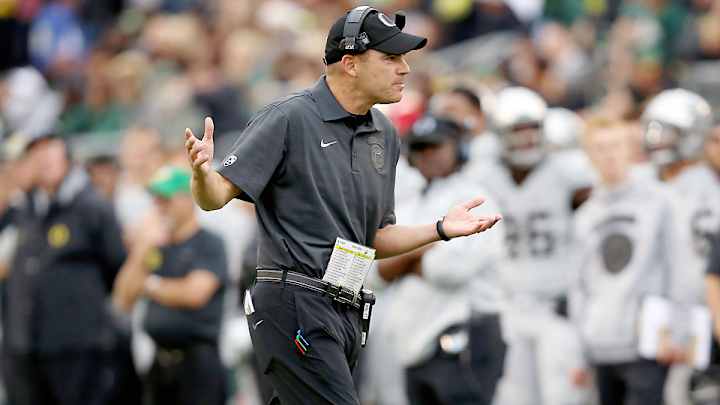Oregon's future looks in jeopardy after loss to Washington State

The most shocking game of this college football season included one program’s largest margin of defeat in more than a decade. On Saturday, that program, Oregon, suffered an equally stunning loss, only instead of a blowout it was decided in double overtime. The Ducks fell 45–38 to Washington State at Autzen Stadium to drop to 3–3 on the season and 1–2 against Pac-12 competition.
If the Utah defeat was written off in some quarters as a hiccup for an otherwise steady program, this loss made clear that interpretation was too generous. It’s not just that the Ducks won’t even come close to competing for a spot in the College Football Playoff a year after they fell one game short of winning it. It’s that Oregon’s performance this season suggests it’s no longer the program that can be expected to stockpile double-digit win seasons and big-time bowl appearances while lording over one of the nation’s top conferences.
Loss to UW makes clear USC made wrong decision in hiring Sarkisian
Those things were easy to take for granted when a brilliant tactical mind (Chip Kelly) stalked the sidelines and a once-in-a-generation quarterback (Marcus Mariota) piloted a devastating offense.
By guiding the Ducks to consecutive double-digit win seasons and a national championship game appearance in 2015, Kelly’s successor, Mark Helfrich, provided evidence that he could keep the machine humming at high speed. Yet this season offered an entirely different challenge: Could Helfrich win without the best player in program history?
The haphazard manner in which Oregon went about acquiring Mariota’s heir didn’t inspire confidence. It wasn’t until the middle of August, after Oregon had already started preseason workouts, that Vernon Adams was able to join the program when he passed his last math test at Eastern Washington. Adams arrived with impressive credentials—consecutive runner-up finishes for the Walter Payton Award and a track record of picking apart Pac-12 defenses—but the fact that Oregon’s offensive plans seemingly hinged on the addition of a Big Sky conference transfer who received zero FBS scholarship offers out of high school was telling.
How much blame Oregon deserves for not recruiting and/or developing Mariota’s successor in-house misses the point. What’s clear is that the Ducks failed to execute a smooth transition from the end of his college career into the future. In the past, Kelly’s offensive acumen may well have been enough to cover up a major deficiency at the most important position on the field. Absent that, Oregon came up with an underwhelming backup (Jeff Lockie), a walk-on (Taylor Alie) and the 11th hour importation of an FCS player (Adams) with no prior experience running the offense and precious little time to learn it before Week 1.
Pinning Oregon’s poor start on bad quarterback play—and the lack of an offensive wizard to overcome it—is reductive. For one, Oregon entered Saturday ranked 23rd nationally in yards per play and 20th in Football Outsiders’ S&P + ratings. That’s not bad—it’s just not Oregon-level good. The Ducks’ defense, under second-year coordinator Don Pellum, remains porous. Oregon entered Saturday ranked 47th nationally in yards allowed per play and 91st in Football Outsiders’ S&P+ Ratings.
Texas lights spark for possible revival in Red River upset of No. 10 Oklahoma
Then there’s Sports Illustrated’s Pete Thamel’s report that Oregon players feel “entitled.” A lot has to go wrong for a program accustomed to squashing subpar conference opponents like Washington State to confront the very real possibility of missing a bowl game before Halloween.
There is time still for Oregon to recover, to make something of a season seemingly headed for more disappointment. At this point, with all meaningful postseason goals out of reach, the most encouraging development would be signs of progress. Oregon probably can’t compete for a Pac-12 North title this season, but a strong finish, with multiple wins against the conference’s upper crust—games remain against Cal, Stanford, Arizona State and Washington—would offer hope that the Ducks can right the ship and enter 2016 on more solid ground.
Oregon is playing for the future now. The problem is no one’s quite sure what the future holds.

Chris Johnson writes about college football, college basketball, recruiting and the NBA.